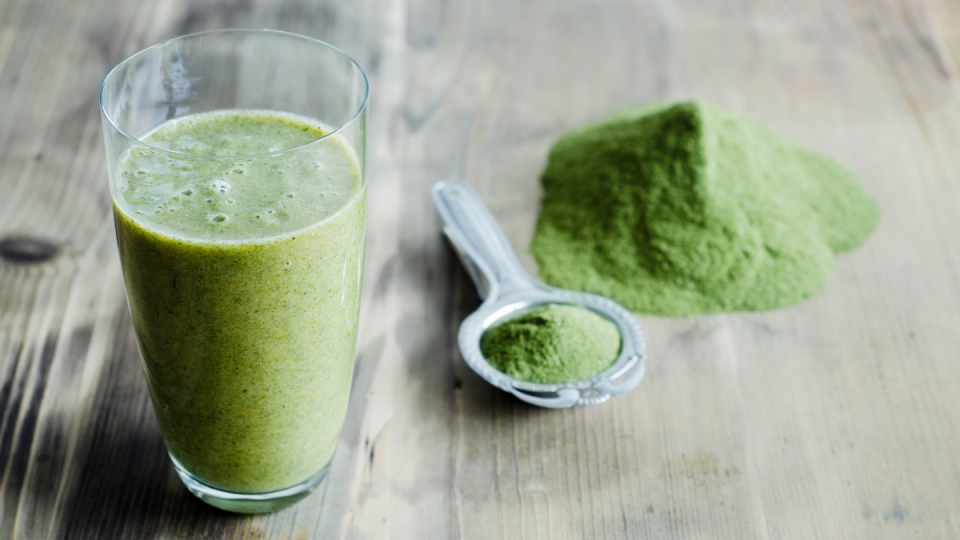Are Powdered Greens Worth It? Experts Weigh In
From mushroom powder to protein powder, everyone loves mixable and sippable shortcuts to health. In fact, the global superfood powders market size was valued at $6.57 billion in 2022. And it's expected to grow even more by the end of the decade. And powdered greens, or “greens powders” that can be mixed with liquids and promise to improve digestion, minimize bloating and fulfill your daily nutrient needs are the newest craze, garnering over 20K posts on Instagram. Are powdered greens worth it or are these promises too good to be true? We asked experts to weigh in on the benefits of powdered greens. Keep reading for their thoughts.
What are powdered greens?
“Powdered greens are effectively freeze-dried fruits, vegetables, enzymes, probiotics, fiber and extracts that are milled into a fine, easily mixable powder,” says Jason Levee, MS, RD, CDN, founder of Whole Family Nutritionist. “They purport to be a one-stop shop for all of your daily nutrient needs.” Contents lists can vary across brands; however, vitamins B, C and D as well as magnesium and zinc are common ingredients.
Like with any other nutritional supplement, “a lot of people are looking at [powdered greens] as a way to boost their nutrition,” says registered dietitian nurse Erin Palinski-Wade RDN, CDE, CPT. “They tend to be especially appealing to those people who feel like they don't get in enough fruits and vegetables, or they don't love to eat fruits and vegetables.”
MUST-READ: The Cottage Cheese Trend Is Far From Over: Why One Expert Calls It a “Miracle Ingredient”
Can powdered greens replace vegetables?

Put simply, “no,” says Michelle Routhenstein MS, RD, CDCES, CDN, Preventive Cardiology Dietitian at EntirelyNourished.com. “There is no evidence greens powders can be just as or more effective in increasing energy, boosting immunity or improving gut health compared to whole food produce.”
Palinski-Wade cautions against thinking of powdered greens as interchangeable with eating fresh produce. “When you think about a dietary supplement, think about it as a supplement to an already well-balanced diet,” she says. The body is better able to absorb vitamins and minerals through food. And studies show that relying on your diet rather than supplements may be better in the long run for your health.
Related: I’m a Doctor and These Are the Daily Vitamins I Recommend for Women
Are powdered greens a good source of prebiotics and probiotics?
The most popular greens powder brands, notably Bloom claim to support a healthy gut via prebiotics and probiotics. However, research shows that probiotics are most effective in delayed-release capsules. What's more, “powdered greens are immediately digested, making it questionable if the probiotic even gets to the area of your gut where it’s needed,” says Elizabeth Sharp, MD, IFMCP, CEO of Health Meets Wellness.
Regarding prebiotics, the ‘food’ for the good bacteria in your gut, Dr. Sharp explains that, “you’re missing a lot of that prebiotic benefit when you’ve already broken down a cell’s structure by grinding up vegetables into a powder. Even if [prebiotics] are listed as an ingredient, the optimization in your gut is much lower than eating vegetables.”
Related: Do Probiotics Help With Bloating? Docs Say Yes — If You Choose the Right Ones
What do I need to know about consuming powdered greens?

You could get too many vitamins
Like other dietary supplements, powdered greens are not regulated by the FDA. Because of this, Levee cautions that powdered greens may contain way more than the average adult’s daily need of certain micronutrients. And that may be hazardous to your health. “Risks for toxicity are higher for fat-soluble vitamins (vitamins A, D, E and K) because our bodies can store them. For water-soluble vitamins or other nutrients, you will simply pee out the amounts you cannot absorb. So you’re literally flushing the money you spent on this supplement down the drain,” says Levee.
If you have any medical conditions or are on any medications, talk to your doctor or pharmacist before adding a greens powder to your diet. The reason? Some products may have ingredients that could potentially negatively interact with medications or conditions. “For example, if someone has kidney issues and is on a potassium-restricted diet, they would have to be very careful with greens, which are very high in potassium," says Palinski-Wade.
You could be ingesting harmful ingredients
If you are interested in adding a greens powder to your daily routine, it’s essential to choose a brand that participates in third-party testing of their product. “Third-party testing makes sure that what is labeled on the product as the active ingredients is actually valid,” says Dr. Sharp. “Heavy metal testing is also very important, especially for those pregnant, lactating or consuming a lot of fish. In these cases, testing for mercury and cadmium is extremely important.”
How can you tell if your product has been tested? Dr. Sharp advises looking for a certificate of analysis (COA). Elements of powdered greens that should be tested are ingredients, potency, safety and purity. “Companies I trust for third-party testing are: ConsumerLab, U.S. Pharmacopeia and NSF International,” says Dr. Sharp. “Also look for a seal of the FDA's Good Manufacturing Practices (GMPs), which can be helpful to determine quality and standards.”
A few powdered greens brands that Dr. Sharp recommends for safe consumption include:
Ancient Nutrition’s Organic SuperGreens
Garden of Life’s Raw Organic Perfect Food Green Superfood Original Powder
Promix’s Raw Greens
You won’t absorb all the vitamins
Because the body absords different vitamins differently, consuming vitamins via powdered greens may affect the way your body absorbs them and mitigate the advertised benefits of the powder. “One of the keys with eating vegetables is that the fiber provides food for your lower GI tract bacteria, and that food is broken down into small chain fatty acids. That helps promote digestion of a lot of vitamins and minerals in the gut,” says Dr. Sharp. “You’re going to miss all of that when you take the greens powder.”
Are powdered greens worth it?

The consensus from our experts? Get your greens in their original source. “Generally speaking, [powdered greens] are not effective supplements,” says Levee. “The claims made by these companies are not supported by a robust research base. You’re better served taking the money and the resources you’d spend on powdered greens and spending them on whole fruits, vegetables, whole grains, lean proteins and healthy fats,” he adds.
How to get your veggies without powdered greens
At the end of the day, the goal of products like powdered greens is to make vegetable consumption more palatable. Our experts share their favorite tasty tips for incorporating whole food nutrients in your diet for a fraction of the price.
Blitz veggies into sauces
Palinski-Wade tells her clients to think about what they’re doing already and where they can add in a bit of vegetables. “If you’re going to have pasta, you can blend peppers and onions in the food processor with your tomato sauce to enhance the number of vegetables you’re getting in a meal without changing the flavor of your dish,” she says.
Slip greens into your smoothies
“Consider swapping a greens powder for a handful of spring mix into your smoothie,” says Routhenstein. “This will not only boost nutrient content but also add to your fiber of the day which improves gut health, colon health and brain health.”
Steam veggies to make them easier to digest
One of the reasons folks might turn to a greens powder is to avoid the gas and bloating caused by high-fiber vegetables. If you don’t like or can’t tolerate raw vegetables, Dr. Sharp says, “steaming is the way to go.” Not only is this cooking method best for preserving cancer-fighting nutrients in our food, steaming also helps your body better digest cruciferous vegetables to quell any veggie-induced flatulence or other IBS symptoms.
This content is not a substitute for professional medical advice or diagnosis. Always consult your physician before pursuing any treatment plan.
What Nutritionists Really Think About Colostrum, the Smoothie Add-In Some Are Calling ‘Liquid Gold’
Are Prebiotic Sodas Good for You? Top Doctors Weigh In
Sleepy Girl Mocktail: Does the Trendy Sip Live Up to the Hype? Experts Weigh in

